Overview
The article highlights the important events organized by the American Diabetes Association (ADA), showcasing their vital role in advancing diabetes care and fostering a sense of community. Events like the Scientific Sessions and Tour de Cure not only serve to promote education and research but also bring together individuals affected by diabetes. This unity enhances awareness and support for effective management strategies.
It's understandable to feel overwhelmed when navigating diabetes, but these events provide a nurturing environment where you can connect with others who share similar experiences. By participating in these gatherings, you can gain valuable insights and find encouragement in your journey.
We encourage you to explore these opportunities, as they not only offer education but also create a supportive network that can help you manage your condition more effectively. Remember, you're not alone in this journey; the ADA is here to support you every step of the way.
Introduction
In a world where diabetes touches the lives of millions, the American Diabetes Association (ADA) serves as a beacon of hope and support. Since its establishment in 1940, the ADA has been dedicated not only to preventing and curing diabetes but also to enhancing the quality of life for those affected by this chronic condition. With a vision of a future free from the burdens of diabetes, the organization emphasizes education, advocacy, and innovative research as vital pillars in the ongoing battle against this disease.
It's understandable to feel overwhelmed as alarming statistics reveal a rising incidence of diabetes among youth and significant healthcare costs associated with its management. This is where the ADA's proactive initiatives and community-focused events become increasingly essential. Through a comprehensive approach that integrates cutting-edge research, educational resources, and community support, the ADA continues to empower individuals affected by diabetes. You're not alone in this journey; together, we can foster a collaborative environment where hope and health can thrive.
The American Diabetes Association: Mission and Vision
Founded in 1940, the American Diabetes Association (ADA) has dedicated itself to preventing and curing diabetes, while also striving to improve the quality of life for all individuals affected by this condition. The ADA envisions a future free from the burdens of diabetes, positioning itself as a trusted resource and a supportive community for those impacted. Central to their vision is a commitment to education, advocacy, and groundbreaking research, which play a crucial role in the ongoing battle against this chronic condition.
The ADA's mission is underscored by its proactive approach to managing diabetes, as highlighted by the alarming statistics surrounding the illness. For instance, during the 2017-2018 period, approximately 5,293 children and adolescents were diagnosed with type 2 diabetes, revealing a concerning trend that calls for targeted public health interventions. This data reflects the ADA's urgent call for increased awareness and education, particularly among minority groups who are disproportionately affected.
As we reflect on these findings, it's clear that the rising incidence of diabetes among youth necessitates immediate action and support.
Looking ahead to 2025, the ADA plans to publish the Abridged Standards of Care for primary care providers, which will serve as an essential resource for healthcare professionals in effectively managing diabetes. This initiative aligns with the ADA's broader vision of enhancing access to self-management education and support services, a critical component in empowering individuals to take charge of their health. Despite these efforts, participation in self-management education services remains low, with fewer than 7% of newly diagnosed individuals engaging within their first year.
This statistic highlights the pressing need for increased awareness and education to encourage participation in these vital services.
The ADA's commitment to fostering a nurturing community is further illustrated by the events and camps held throughout the United States, which aim to unite individuals and families affected by diabetes. These gatherings not only provide essential education but also create a space for shared experiences and encouragement. As Charles "Chuck" Henderson, the ADA's chief executive officer, emphasizes, "Enhancing the lives of individuals impacted by this condition is a key part of the ADA’s mission."
This sentiment embodies the organization's dedication to offering the reliable assistance essential for those managing blood sugar conditions and their caregivers.
In line with the ADA's mission, T2DSolutions is committed to empowering individuals affected by diabetes through comprehensive resources and community support. As a new resource center, T2DSolutions seeks to enhance the ADA's initiatives by providing educational materials and organizing events that promote community involvement and assistance for those managing their condition.
Through its history and ongoing initiatives, including collaborations with the CDC to improve access to self-management education and support services, the ADA continues to play a pivotal role in the prevention and management of diabetes. Their vision for 2025 reflects a comprehensive approach that integrates education, community support, and innovative research, ensuring that all individuals impacted by diabetes have the resources they need to thrive.
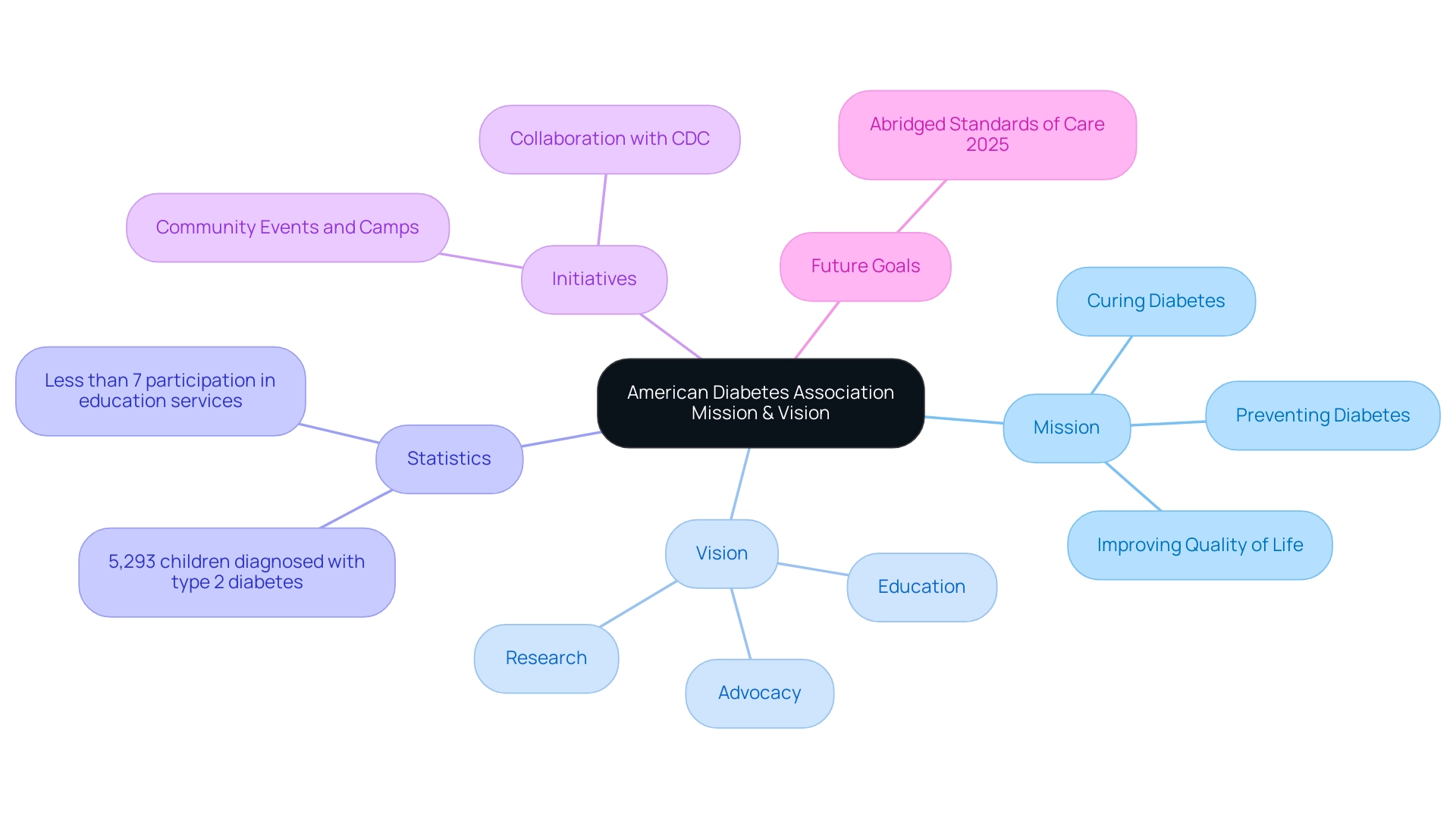
Key Events Organized by the American Diabetes Association
The American Diabetes Association events hosted each year play a crucial role in advancing care for diabetes and fostering community involvement. Among these, the 2025 Scientific Sessions, scheduled for June 20-23 in Chicago, will gather top specialists to share groundbreaking research discoveries and innovative approaches in blood sugar control and prevention. This event is particularly significant, as it not only showcases the latest advancements but also encourages networking among healthcare professionals, researchers, and advocates.
In addition to the Scientific Sessions, the ADA organizes the Clinical Update Conference, focusing on the most recent clinical practices and guidelines for managing health conditions. These conferences are vital for healthcare professionals who strive to stay informed about evolving treatment protocols and patient care strategies.
Another highlight is the Tour de Cure, a leading fundraising event that combines cycling, running, and walking to raise awareness and funds for research on blood sugar conditions. This event exemplifies community engagement, uniting individuals and families affected by diabetes to support a shared cause while promoting physical activity and healthy living.
Statistics emphasize the importance of these events: the average medical expenditures for individuals diagnosed with diabetes were 2.6 times higher than those without the condition, with costs rising from $10,179 in 2012 to $12,022 in 2022. These figures highlight the urgent need for effective strategies for blood sugar regulation, which are frequently discussed and developed during American Diabetes Association events. Additionally, the ADA's commitment to comprehensive care for individuals with diabetes is evident in the recent guidelines for cardiovascular health, which underscore the importance of blood pressure monitoring and screening for peripheral artery disease—essential components of thorough diabetes care.
Moreover, case studies reveal that among adults with diabetes, 47.4% had an A1C value of 7.0% or higher, indicating that many face challenges with glycemic control. Notably, variations in A1C levels among different age groups suggest that personalized strategies are necessary. American Diabetes Association events, such as the Scientific Sessions, aim to address these challenges by equipping healthcare professionals with the tools and knowledge required to enhance patient outcomes.
T2DSolutions is dedicated to supporting individuals and families affected by blood sugar conditions by providing extensive resources and education. By engaging with T2D Solutions, participants of ADA events can access valuable information that deepens their understanding of health management. The success stories emerging from the ADA's events illustrate their impact on blood sugar management and community support, reinforcing the belief that collaborative efforts can lead to improved health outcomes for those living with diabetes.
For more information on how T2D Solutions can support you in your health journey, please visit our website.
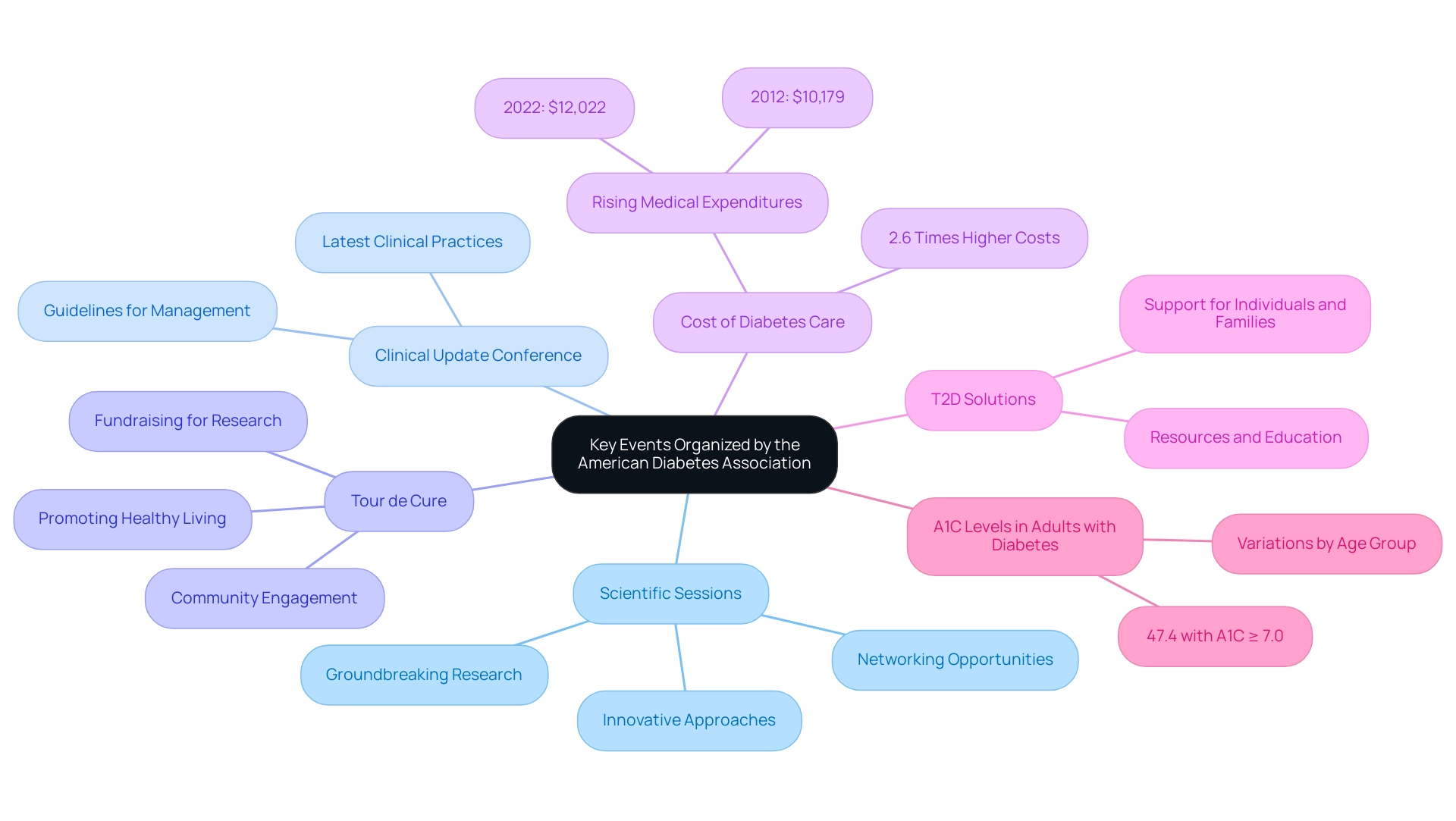
Advancements in Diabetes Research and Innovation
The American Diabetes Association (ADA) is at the forefront of advancing research and innovation related to diabetes, playing a pivotal role in addressing the challenges faced by individuals living with this condition. Events like the 'Innovation Challenge' provide a vital platform for emerging companies to showcase innovative solutions that tackle daily health challenges. In 2024, the ADA highlighted pioneering research focused on enhancing insulin delivery systems and developing new medications—essential advancements for improving the quality of life for those affected.
It's understandable to feel overwhelmed when considering the impact of diabetes. In 2021, this condition was the eighth leading cause of death in the United States, underscoring the critical need for effective management strategies. Recent advancements in blood sugar management research have shown significant progress, with 2024 marking a year of notable achievements. For instance, studies have demonstrated that innovative insulin delivery methods can lead to better glycemic control, ultimately reducing the risk of complications.
The financial implications are also profound. The total estimated expenses related to diagnosed conditions in the U.S. reached $413 billion in 2022, with direct costs climbing from $227 billion in 2012 to $307 billion in 2022. This stark reality highlights the urgent need for effective solutions that can ease the financial burden on patients and healthcare systems alike.
Dr. Tedros Adhanom Ghebreyesus, WHO Director-General, emphasized, "To bring the global health crisis under control, countries must urgently take action." He advocates for policies that support healthy diets, physical activity, and, importantly, health systems that provide prevention, early detection, and treatment. The American Diabetes Association events, including the ADA's Innovation Challenge, not only foster creativity but also encourage collaboration among researchers and healthcare professionals.
Case studies from earlier challenges reveal that corporate health programs, which offer employees access to care, counseling, and digital tools, can significantly enhance diabetes management in the workplace. These initiatives lead to improved health outcomes and reduced healthcare costs, demonstrating the tangible impact of innovation on patient care.
As we look ahead to 2025, the focus on innovation in blood sugar management continues to grow. Authorities in the field remain hopeful about the promise of new technologies and treatment alternatives that could revolutionize diabetes management. The ADA is dedicated to promoting these advancements, ensuring that individuals facing blood sugar challenges have access to the latest research and solutions, empowering them on their health journey. You're not alone in this journey; we are here to support you every step of the way.
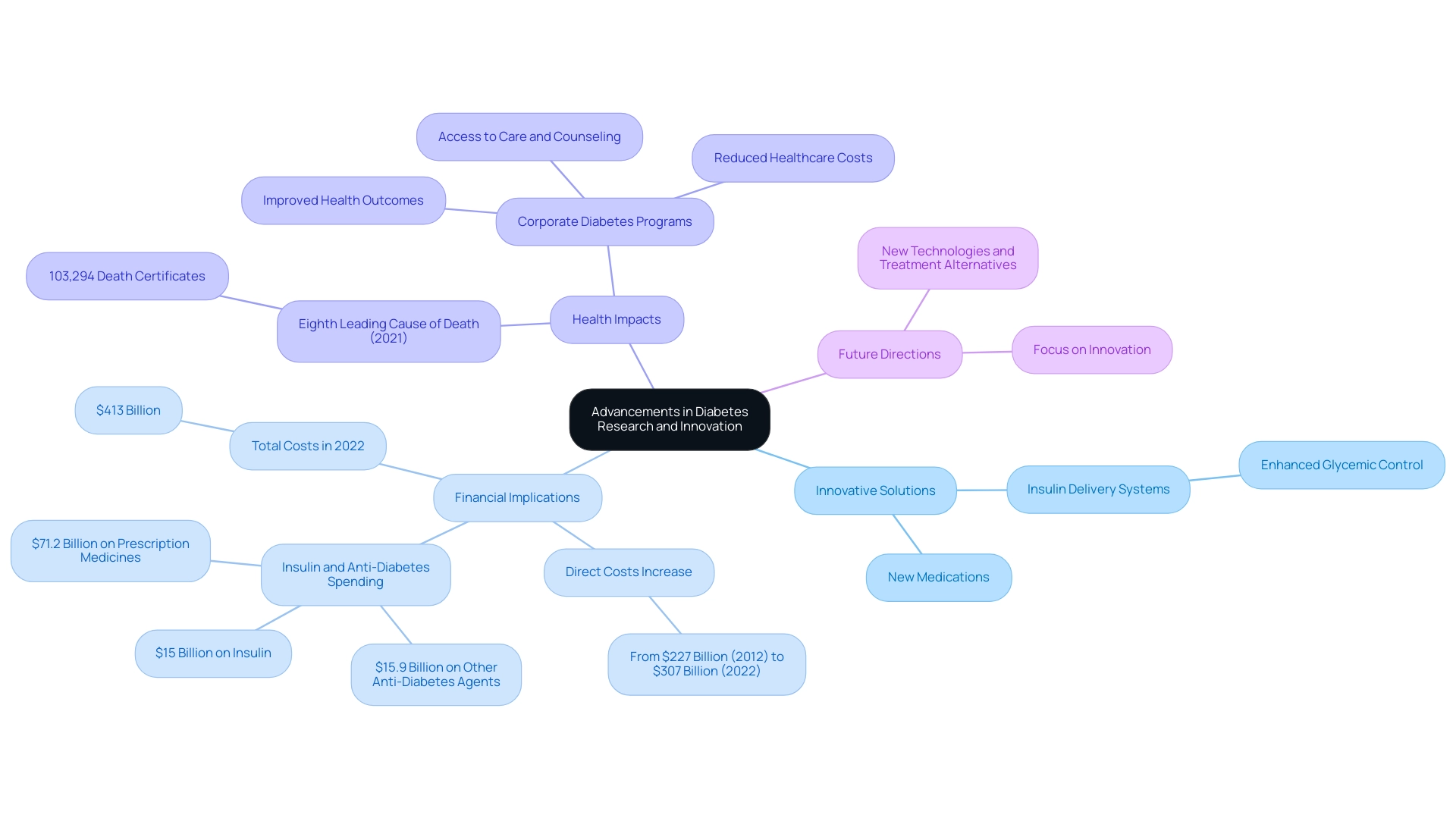
Educational Resources and Support for Diabetes Management
The American Diabetes Association (ADA) offers a comprehensive selection of educational materials aimed at empowering individuals managing their condition. Their self-management education programs are pivotal in equipping patients with the essential knowledge and skills necessary for effective care. These programs encompass a variety of formats, including online courses, webinars, and American Diabetes Association events, all designed to foster engagement and support among participants.
As we look to 2025, the ADA's educational resources are more crucial than ever, particularly as statistics reveal that approximately 70.8% of U.S. adults diagnosed with this condition have elevated blood pressure levels. This underscores the need for comprehensive management strategies that the ADA's resources can help facilitate. Furthermore, about 18% of adolescents aged 12 to 18 were found to have prediabetes from 2005 to 2016, highlighting the importance of early intervention through education.
The effectiveness of these self-management education programs is evident in their positive impact on participants' health outcomes. Studies indicate that individuals who participate in structured education related to blood sugar management are more likely to achieve better glycemic control and improve their overall quality of life. For instance, case studies on self-management education programs for diabetes-related conditions demonstrate significant improvements in participants' understanding of their situation and adherence to treatment plans. A relevant example is gestational diabetes, which affects 2% to 10% of pregnancies annually.
Education on this condition is essential, as about 50% of women who experience gestational diabetes may later develop type 2 diabetes, highlighting the necessity for targeted educational materials.
Furthermore, the American Diabetes Association events, including the Ask the Experts program, act as an important resource, enabling people living with the illness to connect with specialists and tackle common challenges. This initiative not only offers valuable insights but also cultivates a sense of community among those affected by the condition, particularly newly diagnosed patients who may feel overwhelmed. By providing customized assistance and direction, the program strengthens the concept that collective knowledge and support can result in enhanced health outcomes.
As T2DSolutions launches as a new resource center for education and community support, it seeks to supplement the ADA's offerings by delivering extra resources, tools, and a platform for people to connect and share experiences. By combining the ADA's educational resources with T2DSolutions' initiatives, those managing their health can access a more comprehensive support system. By providing these extensive educational materials, the ADA plays an essential part in improving management of the condition and enabling people to take control of their health.
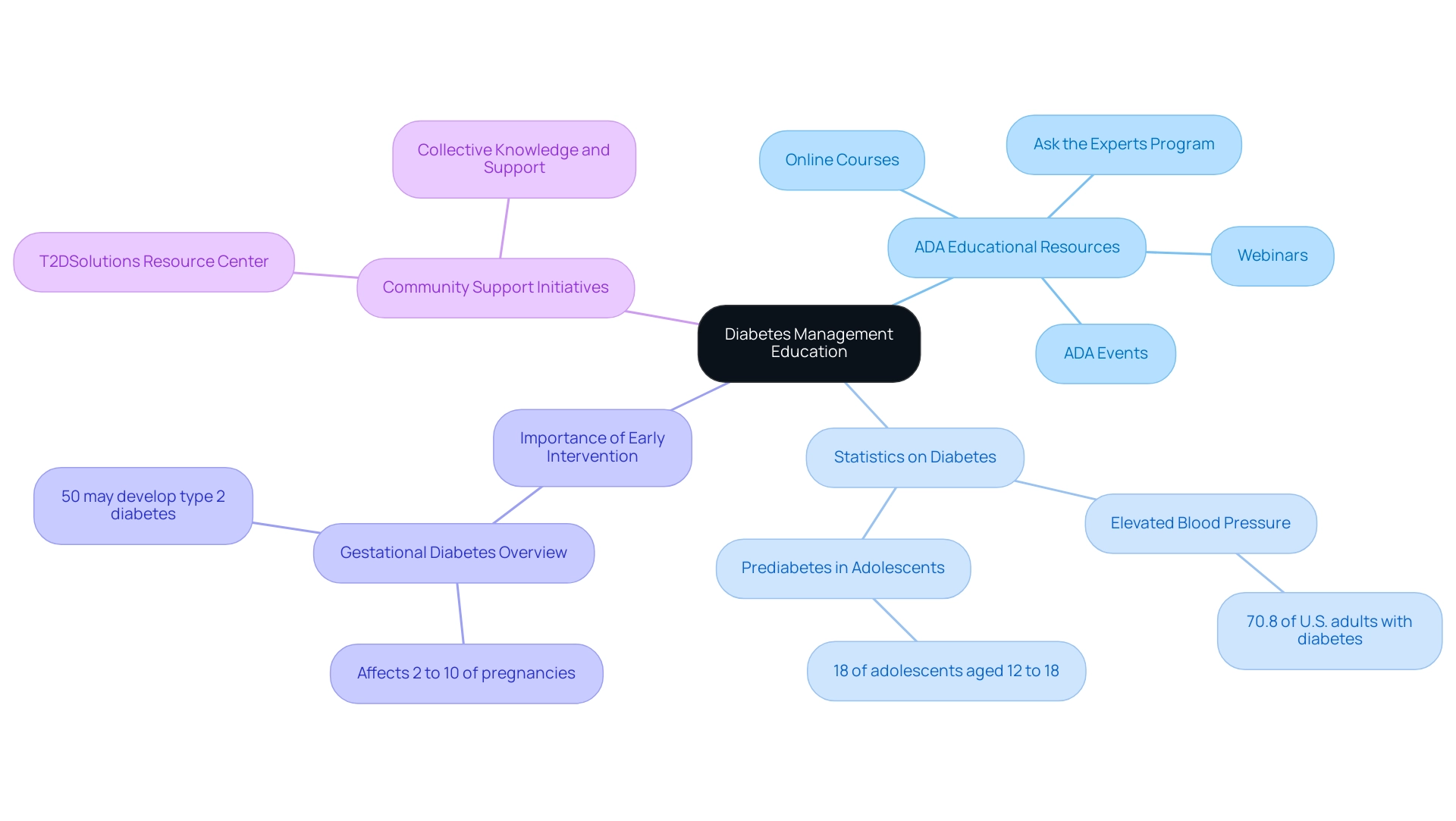
Addressing Co-Morbidities: Diabetes, Heart Disease, and Stroke
The American Diabetes Association (ADA) understands the vital connection between blood sugar disorders and various health conditions, especially heart disease and stroke. Their initiatives aim to educate patients about the risks linked to these co-morbidities and to promote effective preventive measures. A primary focus of the ADA is on lifestyle modifications, such as dietary changes and regular physical activity, which have been shown to significantly reduce the risk of cardiovascular complications for individuals with high blood sugar levels.
Recent statistics reveal that those with such conditions face an increased risk for heart disease. Notably, studies show that female patients have a significantly lower risk for cardiovascular problems compared to their male counterparts (OR = 0.67). This underscores the importance of tailored health strategies that consider gender differences in risk profiles. Furthermore, the ADA's commitment to stroke prevention is evident in their ongoing efforts to raise awareness and provide resources for effectively managing these interconnected health concerns.
In a broader context, the Disability-Adjusted Life Years (DALY) count for issues related to blood sugar regulation in Tunisia has been reported at 152 (in thousands). This highlights the global impact of blood sugar conditions on health systems and the pressing need for comprehensive management strategies.
Case studies illustrate the positive effects of lifestyle changes on blood sugar regulation and stroke prevention. For instance, patients who embraced healthier eating habits and increased their physical activity levels reported not only improved blood sugar control but also a reduction in cardiovascular risk factors. By addressing these co-morbidities, the ADA seeks to enhance overall health outcomes for individuals living with these conditions, fostering a holistic approach to care that emphasizes the importance of community support and shared knowledge.
The platform encourages individuals affected by blood sugar issues to share their experiences and connect with others facing similar challenges, nurturing resilience and hope.
In 2025, the ADA continues to prioritize initiatives that focus on blood sugar conditions and cardiovascular wellness. Participation in American Diabetes Association events can lead to improved prevention of heart disease and stroke through effective management of blood sugar issues. By equipping patients with the necessary tools and information, the ADA plays a crucial role in enhancing the quality of life for those affected by this condition and its related health challenges. As A. Zumla observes, collaborative efforts in blood sugar research and oversight are essential for improving care and support for patients.
It is also important to recognize that erectile dysfunction is common in men with diabetes, particularly those at high cardiovascular risk. This highlights the need for comprehensive screening and management strategies.
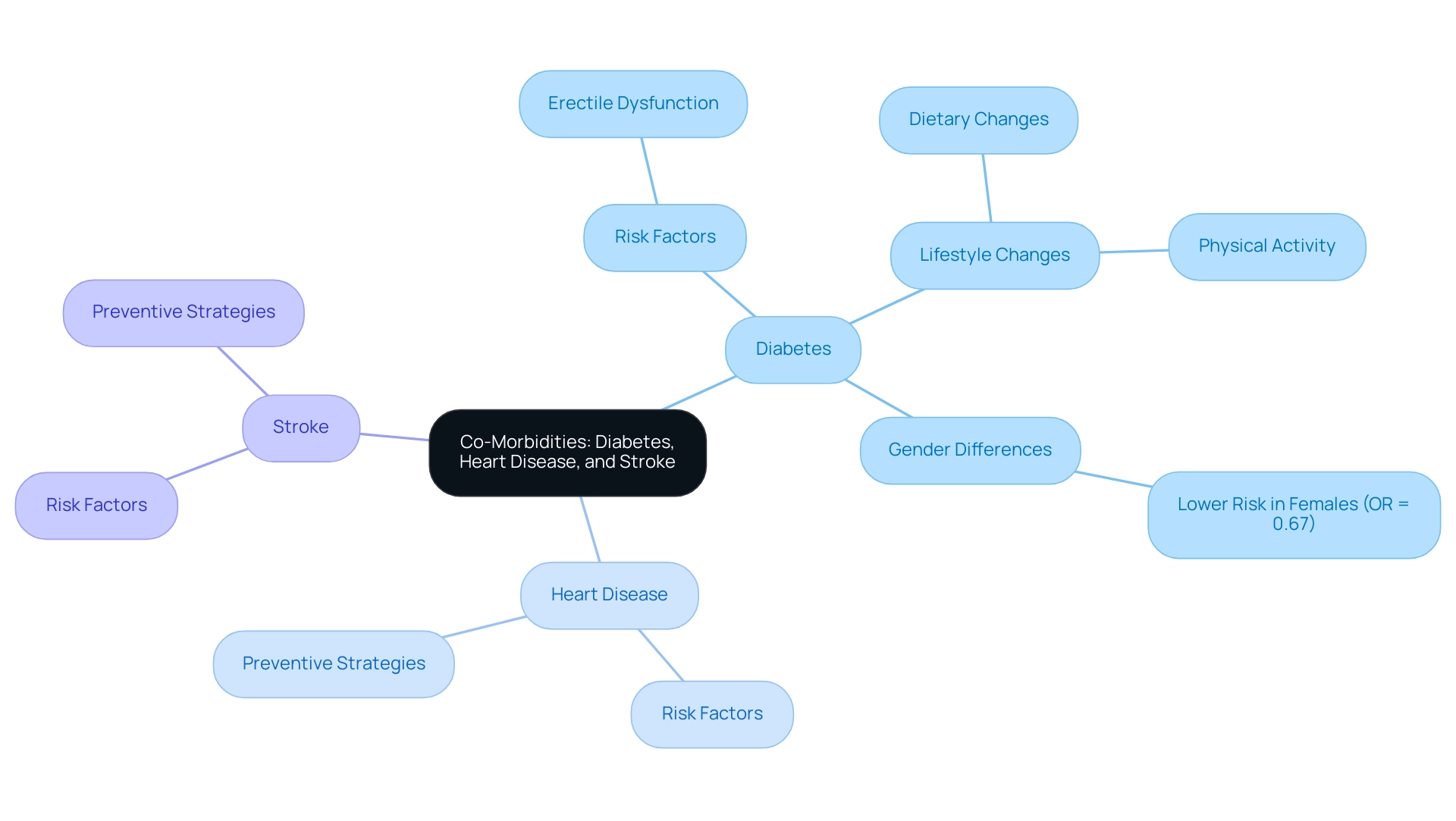
Conclusion
The American Diabetes Association (ADA) plays a vital role in the fight against diabetes, emphasizing education, advocacy, and innovative research to improve the quality of life for those affected. With diabetes rates on the rise, particularly among youth, the ADA underscores the importance of community awareness and education as essential parts of its mission.
Events like the Scientific Sessions and the Tour de Cure not only highlight advancements in diabetes care but also encourage collaboration among healthcare professionals and engage the community. These gatherings serve as invaluable platforms for sharing knowledge and empowering individuals in their diabetes management. The ADA’s educational programs equip patients with the necessary skills for effective self-care, ensuring they feel confident and supported in their journey.
Moreover, the ADA addresses co-morbidities such as heart disease and stroke, reinforcing a holistic approach to diabetes management. By promoting lifestyle changes and offering tailored resources, the organization enhances health outcomes for individuals living with diabetes, helping them lead healthier lives.
In conclusion, the ADA's commitment to diabetes prevention and management is truly crucial. Through collaborative efforts and a supportive community, the ADA envisions a future where diabetes no longer burdens millions. Together, with shared knowledge and resources, a healthier tomorrow is within reach for all those affected by diabetes. Remember, you are not alone in this journey; we are here to support you every step of the way.
Frequently Asked Questions
What is the mission of the American Diabetes Association (ADA)?
The mission of the ADA is to prevent and cure diabetes while improving the quality of life for all individuals affected by the condition through education, advocacy, and groundbreaking research.
When was the American Diabetes Association founded?
The ADA was founded in 1940.
What alarming statistics did the ADA highlight regarding type 2 diabetes in youth?
During the 2017-2018 period, approximately 5,293 children and adolescents were diagnosed with type 2 diabetes, indicating a concerning trend that calls for targeted public health interventions.
What plans does the ADA have for 2025?
The ADA plans to publish the Abridged Standards of Care for primary care providers, which will serve as a resource for effectively managing diabetes and enhancing access to self-management education and support services.
What is the participation rate in self-management education services for newly diagnosed individuals?
Fewer than 7% of newly diagnosed individuals engage in self-management education services within their first year.
How does the ADA foster community among individuals affected by diabetes?
The ADA holds events and camps throughout the United States to unite individuals and families affected by diabetes, providing essential education and a space for shared experiences and encouragement.
What is T2DSolutions and how does it relate to the ADA?
T2DSolutions is a new resource center committed to empowering individuals affected by diabetes through educational materials and events, enhancing the ADA's initiatives for community support and assistance.
What significant events does the ADA organize each year?
The ADA organizes events such as the Scientific Sessions, Clinical Update Conference, and Tour de Cure, which focus on advancing care for diabetes, sharing research, and promoting community engagement.
What are the statistics regarding medical expenditures for individuals with diabetes?
The average medical expenditures for individuals diagnosed with diabetes were 2.6 times higher than those without the condition, increasing from $10,179 in 2012 to $12,022 in 2022.
What challenges do adults with diabetes face regarding glycemic control?
Among adults with diabetes, 47.4% had an A1C value of 7.0% or higher, indicating many face challenges with glycemic control and that personalized strategies are necessary.
How does the ADA address challenges in diabetes management during its events?
ADA events, such as the Scientific Sessions, equip healthcare professionals with the tools and knowledge required to enhance patient outcomes and address challenges in blood sugar management.

